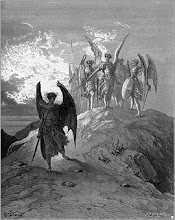As we venture further into the unknown speculative recesses of my internal imaginative flux, we will first look at the decision making process for all sentient creation from a bottom-up perspective before we take a god's-eye-view (mainly because I find it difficult to conceptualise what the latter would entail). When we last left this topic we spoke of monkeys. I just can't help myself.
It's been said that a million monkeys typing for a million years would at some point reproduce the entire works of Shakespeare. An astute commentator observed that with the advent of the internet this notion has been proven false, but just imagine if they did, would it mean anything?
I think it was Camus who used a similar example to tease out how we go about creating meaning for ourselves in life. Some dude lives forever and reproduces the Iliad or the Odyssey, can we say that this event has any merit, given that on an infinite timeline it's inevitable that someone would produce an identical work (I guess it depends on how much you like Homer). Looking at things on a mortal scale, because we're working with a literal deadline -- whether we like to acknowledge it or not -- we face the prospect of being limited in what we can do for purely practical reasons. This makes our choices (like writing an epic poem) a lot more meaningful, because they are now subjected to some form of prioritization, which in all likely hood isn't arbitrarily driven. Our discriminating tastes come into play using the time we have in whatever way we see fit. Like the old saying goes "time is what stops everything from happening at once." We may want it all and want it now, but conditions don't favour the disciples of instant gratification here. We're left to make our way in the world slowly but surely one decision at a time. How we go about choosing is a whole 'nother can of worms that I'll deal with later, the why (as in why our choices matter) will have to do for now.
Sorry eternal monkeys your efforts seen through this paradigm don't amount to much. The limitations of mortality open the way for meaning to mean something. However, when we open our scope and include God in the domain, unfortunately this model doesn't fit. God is an infinite being who does far more then write about heroes with tragic flaws, he makes them. Which doesn't bring us any closer to the celestial selection system. Perhaps I've been asking the wrong question, Why is God a fractal isn't big enough, it's just a less general version of why is there something instead of nothing?
next: extrapolations that could lead to a resolution of the mysteries of the universe, but probably not.
The LDS Church and the Constitution
1 day ago





No comments:
Post a Comment